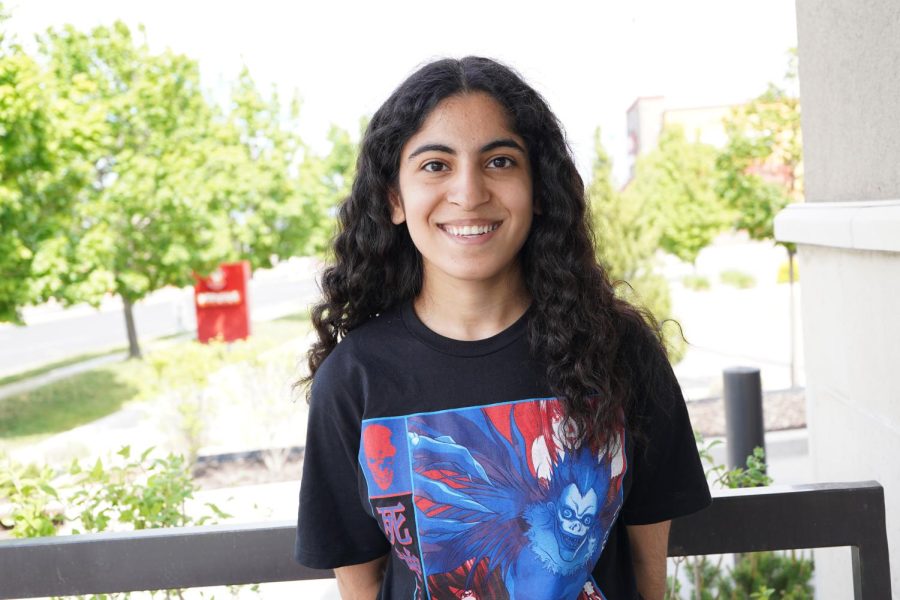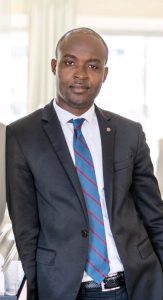Student Refugees and Immigrants Face Barriers in Higher Education
Nadia Yahyapour, a student from Iran, graduated in May with a bachelor of science in biology, posing for a photo on May 16, 2023. (Photo by Paul Hakizimana)
May 23, 2023
Despite a national increase in the overall graduation rate, the dropout rate for foreign-born refugee and immigrant students remains above 30% — three times that of U.S.-born white students, and twice as high as the dropout rate of native-born Latino students, according to the National Education Association.
Desange Kuenihira is the founder of UnDEfeated, a foundation whose mission is to “provide education and opportunities for underprivileged youth and single mothers in Uganda.” When Kuenihira, a refugee from the Democratic Republic of the Congo, came to the United States in 2014, school was her main focus.
“I knew education was my only key out of poverty,” she said.
She started going to school in eighth grade, and she graduated with her associate degree and a full-ride scholarship to the University of Utah. In college, she started her foundation.
“I wanted to give back to my community and help single mothers, especially women who went through child marriage, to start their own businesses,” she said.
According to Kuenihira, one of the biggest barriers refugees face in education is the transition from high school to college.
“We don’t know where to get the resources,” she said.
She mentioned Tino Nyawelo, an associate professor in physics and astronomy at the U, who created a program to help refugee high school students navigate the transition to college.
When Kuenihira came to the United States, she didn’t know how to read or write. Programs like Nyawelo’s helped her get to college.
Another barrier is funding.
“I was one of the lucky or blessed [ones] to have those people who guided me to make sure I ended up getting a full-ride scholarship to college … it was just my desire of wanting to go to college,” she said.
She also understood the power of learning and education.
“Education is not just about getting a degree and getting a good job as most people tend to look at it that way,” she said.
When she got into college, one barrier she faced was finding a sense of belonging. It was difficult to find people who understood her.
“At the end of the day, as a refugee, I did not choose to leave my home — it’s the circumstances that forced me to leave my home — to find a better life,” she said.
She also mentioned that refugee youth often take on parental roles and responsibilities because they speak English.
“And this goes back to where the parents don’t understand the education system here so they’re not able to support their kids within school,” she said. “So that’s where you find a lot of kids are dropped out because their parents don’t know how the system works or how to enforce the child to keep going to school.”
In terms of universities better-supporting refugee students, Kuenihira said it comes down to funding. She mentioned there are some scholarships available to refugee students, but more needs to be done to make tuition cheaper.
She added having cheaper tuition can help student refugees whose parents can’t financially contribute to their education.
Kuenihira urged people to understand the “why” of refugee stories.
“I wish my country was just safe where I could live and raise my family and life could be so much easier there,” she said. “Compared to [the Democratic Republic of the Congo,] I have to work, work, work, work, work the way the system is built out here [in the U.S.]”
She said people should take the time to educate themselves, do research and connect with the refugee community in Salt Lake City.
Nadia Yahyapour is a student at the U who graduated with a biology degree in May from Iran and will start dental school in the fall. She said she had to navigate everything on her own when she first came to the U.
“It was a lot of navigating things by my own. Because I hadn’t had somebody that went to college before me as I am the first college generation,” she said.
Yahyapour said education is important to her because it opens up a lot of doors and can lead to a whole new world of possibilities.
“I can contribute more to the world, and I think that’s what having education is about: being able to contribute as you understand more,” she said.
Political support across the country is faltering. There is a sharp rise of anti-refugee and immigrant sentiment. However, Utah continues to be a safe haven for refugees and immigrants.
Raymond Burton, the executive director of One Refugee, said Utah as a state is friendly toward those of immigrant and refugee backgrounds.
“They are consistently passing legislation to make education more accessible and affordable,” he said.
This year, Utah passed H.B. 102, allowing access to in-state tuition for those with refugee, asylum-seeking, humanitarian parole or temporary protected status.
According to Burton, more must be done.
“Even with funding, there is a lack of support at the college level,” he said. “Academic advisors are overwhelmed and not prepared to provide the intensive one-on-one support that is needed for scholars from the refugee background.”
Burton said One Refugee fills in those gaps by providing intensive academic mentoring, professional development support and financial assistance.









MATENDA Gustave • May 24, 2023 at 7:16 am
Great vision, Education for all. An emphasis should also be put on aged people with dream to study. Ageing should not be the limit!